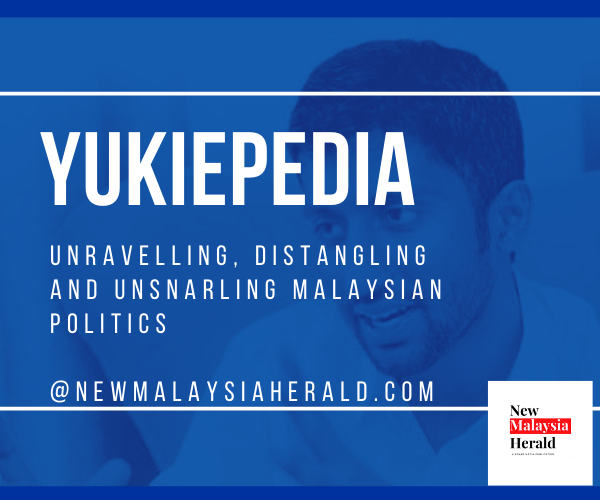By Yuktes Vijay
I have to admit that if Malaysia wants to progress, we need to be hooked up with the modern language, which is English. But the future of Malaysia depends on national unity and national unity means you need to have one common language that unites us, and that language must be the Malay language (Bahasa Melayu).
This article is an ode to Royal Professor Ungku Abdul Aziz bin Ungku Abdul Hamid, the Renaissance Man behind Bahasa Melayu who sadly left us on 15 December.

Unity Advertisement
Colonization of the Portuguese, Dutch and British in Malaya
Despite being colonized by the Portuguese, the Dutch and later the British, Bahasa Melayu remained as the main language used by everyone in the Malay Peninsula. It was the lingua franca and the language of commerce for many centuries in most Southeast Asian port cities before the arrival of the European colonial powers. Such was its importance that during the 19th century, fluency in Bahasa Melayu was a mandatory requirement for all British officers in the Malayan Civil Service.
However, Malaya’s emergence as the world’s greatest exporter of natural rubber, with rubber and tin during the 20th century had major repercussions not only to its social dynamics following the influx of immigrants from China and South India to Malaya, but also the development of Bahasa Melayu. As was the case in many other British colonies, the British were seeking local people who could speak English to help them with administrative matters.

This necessitated the establishment of special schools where English became the medium of instruction as the British slowly expanded their influence both politically and geographically. Eventually, English became the nonpareil language of not only Malaya but also Sabah and Sarawak during British colonial rule.
The Ratification Of Article 152
The relevance of Bahasa Melayu continued to dwindle under the colonization of the Japanese as Japan forcibly imposed their language as well as culture and introduced Japanese as the medium of national education. After the British returned to Malaya following the end of Second World War, Bahasa Melayu’s status had deteriorated so badly that by then it was only used as the medium for lowest schooling language level as the returning colonial master took an extremely aggressive policy to uphold the English Language.
After more than a century of foreign rule, English supremacy as the language for official communication was only put into question when the position of Bahasa Melayu, among others, in an independent Malaya, began to gain prominence during negotiations with the British for independence owing to the awareness towards the need for a national language to unify the Malays, Chinese and Indians. This eventually led to the enactment of Article 152 in our Federal Constitution which prescribes that the national language shall be Bahasa Melayu.
Even before independence, political parties like the United Malays National Organisation (Umno) and the Malaysian Chinese Association (MCA) had agreed that Bahasa Melayu would be the national language via a memorandum in August 1953. Thus, there was little controversy over the acceptance of Bahasa Melayu as the national language and this has been confirmed by Article 152 of the Federal Constitution.
However, the Constitutional framers did not phrase Bahasa Melayu as the “official” language, a stamp that allows the language to be used for all official purposes. Consequently from 1957 to 1967, English continued to function as an official language in administration, education, diplomacy and commerce for ten years after Malaysia’s independence.
Unity Advertisement
The Importance Of Bahasa Melayu
Although there was an initial shift in functional range and importance towards Bahasa Melayu, and English continued to prevail in the eyes of the disgruntled Malay nationalist.
As I had stated earlier, the degradation of Bahasa Melayu in the hands of colonists had compromised its function as a medium of education. Since most Malays were educated in Malay schools, their lack of proficiency in English often relegated them to the sidelines in terms of economic growth and social class.
Discontented Malay nationalists were unhappy with the slow progress in the institutionalisation of Malay in the country and sought to champion Malay in political domains (vis-à-vis the official language, the language of administration, education and for all formal, and official purposes). As I had explained earlier in their divide and rule policy here, the British had given more importance to the English language by employing those from English medium schools to the civil service. Those from the Malay medium and Tamil medium, on the other hand, remained as farmers and labourers for generations as severe lack of education hindered any other form of employment in contemporary Malaya.
Those chain of events subsequently led to the creation of Malaysian Education Policy 1961 and National Language Act 1967 which made Bahasa Melayu not only a national language but elevated its status further by installing it as the sole official language as well as the medium of instruction in mainstream primary, secondary and tertiary education.
The rise from ashes to the greatness of Bahasa Melayu is indeed evident here. Bahasa Melayu survived storms, tsunamis and political schemings before its installation as our national and official language.
With that, part one of how Bahasa Melayu became our national language is concluded.
In the next part, I will share stories about how certain political leaders had vehemently opposed Bahasa Melayu from being our national and official language. I also intend to address the Bahasa Melayu or Bahasa Malaysia quadrum.
Part two will be more political and er, spicy.

New Malaysia Herald publishes articles, comments and posts from various contributors. We always welcome new content and write up. If you would like to contribute please contact us at : editor@newmalaysiaherald.com
Facebook Comments